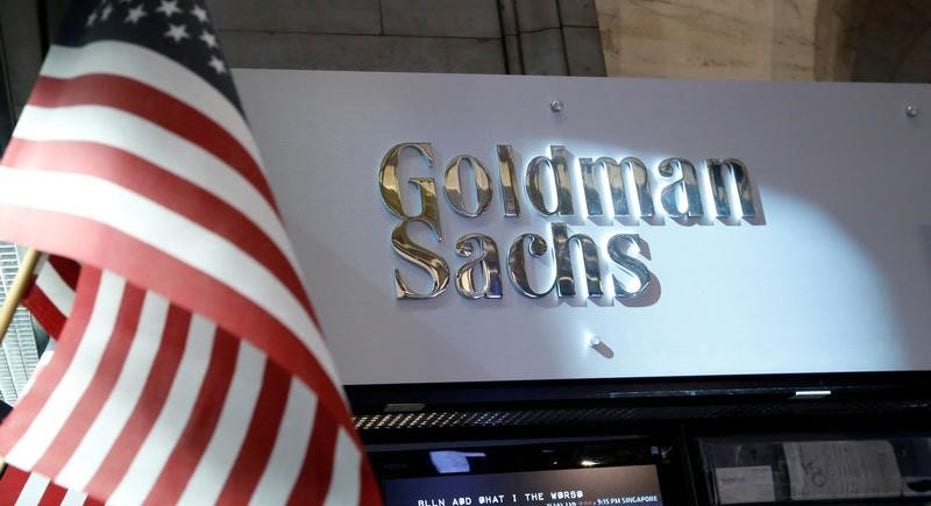Goldman to take a $5 billion charge related to new tax law

Goldman Sachs Group Inc. said Friday it would take a $5 billion earnings charge related to the recent tax overhaul, setting up its first quarterly loss in six years.
While the sweeping U.S. tax changes will ultimately benefit big banks including Goldman due to the lowering of the corporate rate, Wall Street firms and other American companies are wrestling with the more immediate implications of the legislation. Goldman's announcement -- following similar estimates from a handful of other firms, many of them global banks -- hints that along with coming lower corporate tax rates will be a vast one-time jolt to earnings in the new year.
Under one estimate, companies in the S&P 500 index could be forced to take tax-related earnings charges of $235 billion -- about 1% of their combined market value.
In Goldman's case, the charge will push it into a quarterly loss for the first time since 2011 and wipe out much of its full-year profits. But the firm, like its brethren on Wall Street and across much of corporate America, will be a winner in the long run as they enjoy the lowest U.S. corporate tax rate in eight decades and get new flexibility in how they fund themselves, invest in the business, and return capital to shareholders.
"They will make this back and then some," said Devin Ryan, an analyst at JMP Securities. "Tax reform is a positive for Goldman Sachs."
Goldman shares fell 1% in early trading, suggesting some investors were taken aback by the size of the charge, but they recovered most of the slide. Analysts had expected Goldman to take a tax-related earnings hit, with estimates ranging from $3 billion to $6 billion.
About two-thirds of the hit, or $3 billion, is related to a newly enacted, one-time tax on U.S. companies' overseas earnings. Goldman had $31 billion parked offshore at the end of 2016, much of it in cash that will now be subject to a one-time tax of 15%.
Zion Research Group estimates that S&P 500 companies will book quarterly hits of $235 billion in the coming weeks on the $2.8 trillion they have amassed in foreign operations. Drugmakers and technology firms, whose mazes of global intellectual-property arrangements rely heavily on subsidiaries in low-tax countries, account for more than two-thirds of the total.
Just five companies -- Apple Inc., Microsoft Corp., Pfizer Inc., Oracle Corp. and Cisco Systems Inc. -- account for one-third, according to Zions estimates.
Those companies may actually see their long-term tax rates rise. But they will gain flexibility: Many high-technology companies have twisted themselves into fiscal knots to avoid paying taxes on overseas cash, including loading up on debt here at home.
Goldman will also write down the value deferred tax assets, which are past losses that can be used to defray future tax bills. Goldman has about $5 billion of these credits, which are less valuable going forward because the corporate tax rate will be lower.
Deferred-tax assets aren't unique to banks, but Wall Street firms racked up huge losses during the financial crisis and so tend to have a lot of them. Citigroup Inc. has said it would take a $20 billion earnings charge from writing down its $46 billion of deferred-tax assets as well as for charges for repatriating profits invested outside the U.S.
Bank of America Corp. expects to take a $3 billion hit on its $19 billion stash, while Credit Suisse Group AG and Barclays PLC have announced smaller charges in recent days.
In the long run, though, these firms will be among the biggest beneficiaries of the new tax system. The law, signed last week by President Donald Trump, reduces the headline corporate tax rate from 35% to 21%, its lowest level since 1939.
Banks are relatively high tax payers because they get fewer of the breaks, such as for research and development, that are available to technology or pharmaceutical companies. So they benefit more from the rate reduction.
Goldman has averaged a 30% tax rate over the past three years, and Mr. Ryan estimates an earnings benefit of 5% to 10% a year going forward. Morgan Stanley Chief Executive James Gorman said in June that a 25% corporate tax rate -- higher than it ultimately landed -- would lift his bank's earnings by 15% a year.
In another tax-related year-end move, Goldman will deliver some stock compensation owed to top executives a few weeks early in order to generate tax savings for the firm, according to a person familiar with the matter.
The bank expects to save $140 million by delivering stock to about 300 employees in high-tax states like New York and California, the person said. Ordinarily those shares, which were earned in prior years, would be delivered next month.
--Cara Lombardo contributed to this article.
Write to Liz Hoffman at liz.hoffman@wsj.com
(END) Dow Jones Newswires
December 29, 2017 13:36 ET (18:36 GMT)



















